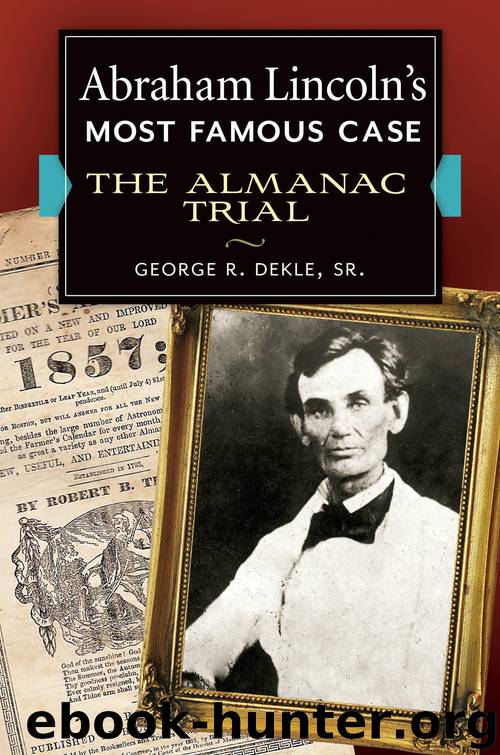Abraham Lincoln's Most Famous Case by George Dekle

Author:George Dekle
Language: eng
Format: epub
Publisher: ABC-CLIO
Published: 2014-03-14T16:00:00+00:00
All these points had to be put together and explained, and Lincoln excelled at the art of persuasive speech. He was the greatest orator of his age, and possibly the greatest American orator of all time. The lawyers involved in the case had nothing but praise for Lincoln’s masterful job of arguing the case to the jury. Caleb Dilworth later wrote, “Of course Mr. Lincoln made a strong argument; everybody expected it and he did it. . . .”15 J. Henry Shaw recalled that Lincoln’s argument “took the jury by storm.” William Walker wrote, “The last fifteen minutes of his speech was as eloquent as I ever heard. . . .”16
What won the case? Opinions varied. Judge Harriott believed that Dr. Parker’s testimony was the deciding factor.17 Brady voted for the almanac as the key piece of evidence.18 Lincoln told the Armstrongs that the testimony of Nelson Watkins was just as important as the almanac.19 Shaw insisted, “I have said it a hundred times, that it was Lincoln’s speech that saved that criminal from the gallows” [emphasis in original]. Dilworth maintained that “what the case turned upon was the instructions [written by Lincoln and] given by the court.”20 Milton Logan thought it was a combination of the almanac and Lincoln’s argument.21Like the witnesses in Rashomon, they argue for different interpretations based on the same basic facts. I think we must conclude that no one stratagem won the case. It was a combination of all factors that carried the day.
Although both the Apolitical Observer’s libel of Lincoln and the myth of the fake almanac have been thoroughly discredited, writers on the Almanac Trial have continued to find fault with Lincoln’s ethics in handling various aspects of the case. Rather than refute all the criticisms, we can let the two most serious allegations serve as proxies for all. They are (1) that Lincoln engaged in chicanery with the witness Nelson Watkins and (2) that Lincoln made an inflammatory and unethical final argument to the jury. We will deal with the issue of Lincoln’s final argument first. We have already discussed how Lincoln, in the closing part of his argument, made reference to his relationship with the Armstrongs. He talked about how he rocked Duff Armstrong as a baby and otherwise played upon the emotions of the jury. William Walker, in describing the effects of Lincoln’s concluding remarks, wrote, “[S]uch the power and earnestness with which he spoke, that the jury and all sat as if entranced, and when he was through found relief in a gush of tears. I have never seen such mastery exhibited over the feelings and emotions of men as on that occasion.”22 By modern standards, Lincoln’s argument was objectionable on several grounds. It alluded to facts not in evidence, it was inflammatory, and it dealt with issues irrelevant to the question of the defendant’s guilt. Lincoln aimed his argument at the jurors’ sympathies as much as at their intellect, and he succeeded in rousing their emotions. Shaw gives us a better idea of the construction of Lincoln’s argument.
Download
This site does not store any files on its server. We only index and link to content provided by other sites. Please contact the content providers to delete copyright contents if any and email us, we'll remove relevant links or contents immediately.
| American Revolution | Civil War |
| US Presidents |
Fanny Burney by Claire Harman(25778)
Empire of the Sikhs by Patwant Singh(22163)
Out of India by Michael Foss(16309)
Leonardo da Vinci by Walter Isaacson(11894)
Small Great Things by Jodi Picoult(6085)
The Six Wives Of Henry VIII (WOMEN IN HISTORY) by Fraser Antonia(4784)
The Wind in My Hair by Masih Alinejad(4420)
The Lonely City by Olivia Laing(4111)
The Crown by Robert Lacey(4098)
A Higher Loyalty: Truth, Lies, and Leadership by James Comey(4024)
The Iron Duke by The Iron Duke(3635)
Millionaire: The Philanderer, Gambler, and Duelist Who Invented Modern Finance by Janet Gleeson(3565)
Sticky Fingers by Joe Hagan(3449)
Alive: The Story of the Andes Survivors by Piers Paul Read(3302)
Papillon (English) by Henri Charrière(3263)
Joan of Arc by Mary Gordon(3253)
Stalin by Stephen Kotkin(3081)
Aleister Crowley: The Biography by Tobias Churton(3015)
Ants Among Elephants by Sujatha Gidla(2920)
